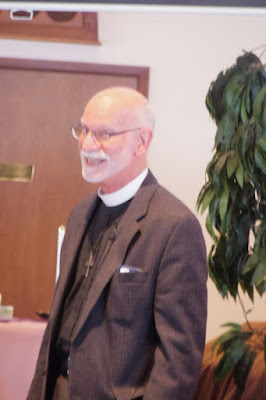| Father Earle’s reflection was a continuation of the theme of “gifts of the spirit.” He talked about two: peace and joy.
Part one: What is peace?
“Is peace the absence of war?”
He mentioned the words “shalom” (Hebrew) and “salaam” (Arabic). They both mean peace, but they mean much more. They mean hello and good bye. In addition to peace, the words also mean:
- prosperity
- safety
- wholeness
- well being
- harmony with God and with other people
As people, we have to challenge ourselves about what peace means to us. Father Earle said that, in the 1960s, some people said, “Everything was fine until those black people started demonstrating.” Black people said, “It wasn’t peaceful for us.” Father Earle, as a young man in 1968, heard a Sunday School teacher express delight that the Rev. Dr. Martin Luther King, Jr., was dead because “he was a communist.” Today, however, King is known as a visionary and a great champion of peace, justice, equality, and freedom.
Who works for peace? Do we have consensus on that?
Is Standing Rock working for peace?
Was Occupy Wall Street working for peace?
What about the peace that comes from God?
The “peaceable kingdom” is described in Isaiah 6-9. Animals, such as lions and lambs, live peacefully with one another.
Part two: What is joy?
What brings you joy in life? Father Earle suggested several things: Snoopy doing a happy dance, marriage, the gathering of the harvest, an end to war, drinking wine, and winning the Superbowl.
Right now, I’m listening to a recording of a six year old boy playing Chopin’s Fantasie-Impromptu, opus 6, on the piano. His interpretation is beautiful. I love Chopin. My favorite composer. For me, listening to this is joy.
The Bible is full of examples of joy, said Father Earle. In Luke’s gospel, there are three stories about joy and they all have to do with finding someone or something of value that is lost. They are a lost coin, a lost sheep, and a lost son. “The joy is being in the presence of God and of finding a hidden treasure,” Father Earle said. Peace and joy can go together. In the fourth chapter of St. Paul’s letter to the Philippians, he talks about the peace of God, which transcends all understanding. He concludes the passage by saying that “the God of peace will be with you.” When the disciples were sad, after Jesus was crucified, they were walking to Emmaus. A man joined them, and they told him about their sadness. They did not know who the man was. They invited him to share supper with them. He told them, “I bring you tidings of great joy.” It was the joy of having been in the presence of God and of finding a hidden treasure. All of a sudden, the disciples realized that they had been walking with Jesus, the risen lord. “Didn’t our hearts burn within us?” they asked.
|

